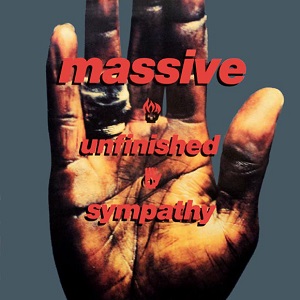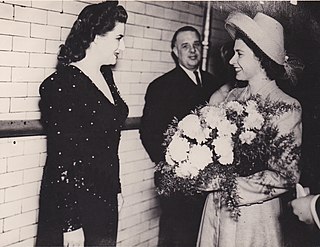Related Research Articles

Ruby Florence Murray was a Northern Irish singer. One of the most popular singers in the British Isles in the 1950s, she scored ten hits in the UK Singles Chart between 1954 and 1959. She also made pop chart history in March 1955 by having five hits in the Top Twenty in a single week.

Matt Monro was an English singer. Known as "The Man with the Golden Voice", he performed internationally during his 30-year career. AllMusic has described Monro as "one of the most underrated pop vocalists of the '60s", who "possessed the easiest, most perfect baritone in the business". Frank Sinatra said of Monro after his death: “If I had to choose three of the finest male vocalists in the singing business, Matt would be one of them. His pitch was right on the nose; his word enunciations letter perfect; his understanding of a song thorough.”

"Secret Love" is a song composed by Sammy Fain (music) and Paul Francis Webster (lyrics) for Calamity Jane, a 1953 musical film in which it was introduced by Doris Day in the title role. Ranked as a number 1 hit for Day on both the Billboard and Cash Box, the song also afforded Day a number 1 hit in the UK. "Secret Love" has subsequently been recorded by a wide range of artists, becoming a C&W hit firstly for Slim Whitman and later for Freddy Fender, with the song also becoming an R&B hit for Billy Stewart, whose version also reached the top 40 as did Freddy Fender's. In the UK, "Secret Love" would become the career record of Kathy Kirby via her 1963 remake of the song. The melody bears a slight resemblance to the opening theme of Schubert's A-major piano sonata, D.664.

Albert Edward Calvert was an English trumpeter successful in the 1950s. Between 1953 and 1958 he achieved seven instrumental hits on the UK Singles Chart, including the two 1955 chart-toppers "Oh, Mein Papa" in 1953 and "Cherry Pink ".

Richard Bryce, known professionally as Dickie Valentine, was a British pop singer who enjoyed great popularity in Britain during the 1950s. In addition to several other Top Ten hit singles, Valentine had two chart-toppers on the UK Singles Chart with "Finger of Suspicion", featuring The Stargazers (1954) and the seasonal "Christmas Alphabet" (1955).

"Unfinished Sympathy" is a song by the English trip hop group Massive Attack. It was released on 11 February 1991 under the temporary group name Massive. The song was written by the three band members Robert "3D" Del Naja, Andrew "Mushroom" Vowles and Grant "Daddy G" Marshall, the song's vocalist Shara Nelson and the group's co-producer Jonathan "Jonny Dollar" Sharp. It was released on 11 February 1991 as the second single from the band's first album, Blue Lines (1991), on the band's Wild Bunch label distributed by Circa Records. The name "Massive" was used to avoid a radio ban, as the track's release coincided with the Gulf War. Produced by Massive Attack and Dollar, the song incorporates various musical elements into its arrangement, including vocal and percussion samples, drum programming and string orchestration by the arranger Wil Malone.
"On the Street Where You Live" is a song with music by Frederick Loewe and lyrics by Alan Jay Lerner from the 1956 Broadway musical My Fair Lady. It is sung in the musical by the character Freddy Eynsford-Hill, who was portrayed by John Michael King in the original production. In the 1964 film version, it was sung by Bill Shirley, dubbing for actor Jeremy Brett.

Ray Anthony is an American retired bandleader, trumpeter, songwriter and actor. He is the last surviving member of the Glenn Miller Orchestra.

"At Last" is a song written by Mack Gordon and Harry Warren for the musical film Sun Valley Serenade (1941). Glenn Miller and his orchestra recorded the tune several times, with a 1942 version reaching number two on the US Billboard pop music chart.

Anne Shelton was a popular English vocalist, who is remembered for providing inspirational songs for soldiers both on radio broadcasts, and in person, at British military bases during the Second World War. During the 1950s and 60s, Shelton had some success on the UK Singles Chart, topping it in 1956 with "Lay Down Your Arms".

"I Put a Spell on You" is a 1956 song written and recorded by "Screamin' Jay" Hawkins. The selection became a classic cult song, covered by a variety of artists. It was Hawkins' greatest commercial success, reportedly surpassing a million copies in sales, even though it failed to make the Billboard pop or R&B charts.

Ronnie Hilton was an English singer. According to his obituary in The Guardian newspaper, "For a time Hilton was a star – strictly for home consumption – with nine Top 20 hits between 1954 and 1957, that transitional era between 78 and 45rpm records. A quarter of a century later he became the voice of BBC Radio 2's Sounds of the Fifties series".

"Throw Down a Line" is a song by Cliff Richard and Hank Marvin, released as a single in September 1969. It peaked at number 7 on the UK Singles Chart.
The Coronets were a British vocal group active in the mid-1950s.
Ronnie Harris was a British singer, active in the 1950s, who had a top ten hit in 1955.
Jimmy Parkinson was an Australian singer and presenter, active in the 1950s, who had a top ten single in the UK singles charts in 1956.
References
- ↑ Larkin, Colin (2008). Encyclopaedia of Popular Music. Oxford: Oxford University Press.
- ↑ "Ray's bouncing back to the big time". Manchester Evening News: 3. 20 November 1965.
- ↑ "Midland entertainments". Birmingham Daily Gazette: 2. 17 September 1946.
- ↑ "Ray Burns". The Stage: 11. 21 December 2000.
- ↑ "Festival of dance music". Coatbridge Leader: 1. 29 January 1955.
- ↑ Jasper, Tony (1976). 20 Years of The British Record Charts 1955-1975. London: Queen Anne Press. p. 5.
- ↑ "Ray Burns". Official Charts Company. Retrieved 26 March 2024.
- ↑ "Ray Burns family interview with Michael Barrymore". youtube. Retrieved 26 March 2024.
- ↑ "29 Jan 1977 – Series Five (21)". You're a star, superstar. 30 January 2021. Retrieved 26 March 2024.